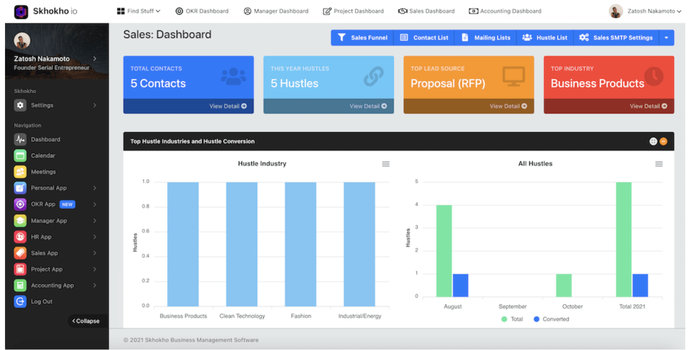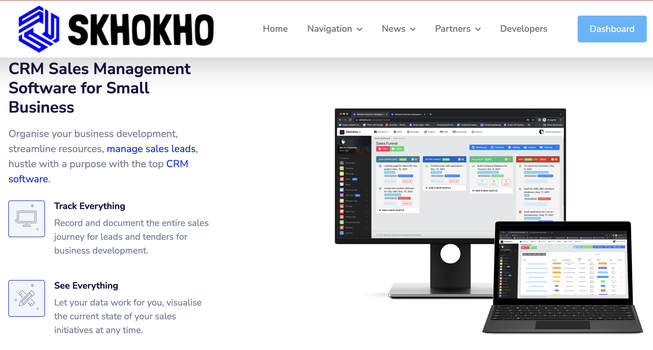Choosing the Right CRM for Your Business: A Comprehensive Guide
In any business your customer is a key stakeholder and you have to maintain a good relationship with them. A CRM is a useful tool help manage customer interactions, improve relationships, and drive business growth. A Customer Relationship Management (CRM) system is crucial for businesses for several reasons. A CRM system allows businesses to store and manage all customer-related information in one centralised location.
This includes contact details, communication history, purchase history, and more. By having a comprehensive view of customer interactions, businesses can better understand their customers' needs and preferences. This enables personalized and targeted communication, fostering stronger and more meaningful relationships.

Benefits of CRM Systems
CRM systems facilitate better coordination between sales and marketing teams. Marketing can use customer data to create targeted campaigns, and sales teams can leverage this information to understand leads and customers better. With features like email integration and automated workflows, CRM systems streamline communication processes.
Businesses can send timely and relevant messages to customers, improving engagement and satisfaction. CRM systems often include tools for sales automation, helping teams manage leads, track deals, and streamline the sales pipeline. This leads to more efficient sales processes and better conversion rates.
Here are more benefits of CRM systems:
Data-Driven Decision-Making:
- CRM systems provide valuable insights through analytics and reporting features. Businesses can use this data to make informed decisions, identify trends, and optimise their strategies for better performance.
Customer Service Improvement:
- A CRM system helps in managing customer support by keeping track of service requests, resolutions, and feedback. This leads to quicker response times, better issue resolution, and overall improved customer satisfaction.
Scalability and Growth:
- As businesses grow, the amount of customer data and interactions also increases. CRM systems are designed to scale with the business, providing a flexible and adaptable solution that can support growth.
Time and Cost Savings:
- Automation features in CRM systems reduce manual data entry and repetitive tasks, saving time for employees. This efficiency translates into cost savings for the business.
Competitive Advantage:
- In today's competitive business landscape, delivering a superior customer experience is a key differentiator. A well-implemented CRM system can contribute significantly to gaining a competitive edge by optimising customer interactions and satisfaction.

However, before you select a CRM system, we recommend you follow a few steps first. We compiled a checklist to help you make the right choice for your business.
In this blog we will discuss:
- Understanding Your Business Needs
- Types of CRM Systems
- CRM Solutions for Your Business
- Key Features to Look for
- User-Friendliness and Adoption
- Integration with Existing Systems
- Budget Considerations
- Security and Compliance
Understanding Your Business Needs
In the initial stages of selecting a CRM, a comprehensive understanding of business needs serves as the cornerstone for an effective decision-making process. Begin by conducting a thorough assessment of your organisational objectives, whether they involve boosting sales, refining marketing strategies, or improving customer relationships.
Simultaneously, identify and analyze current pain points in your existing processes. Pinpoint areas that may be hindering productivity, such as communication gaps or challenges in lead management. This introspective phase lays the groundwork for a targeted CRM solution that aligns precisely with your business goals and operational requirements.
Moreover, consider the scalability and adaptability of the CRM to accommodate future growth and evolving business dynamics. Anticipate the changing needs of your organization and ensure that the chosen CRM solution is not only a present fit but possesses the flexibility to scale in tandem with your business expansion. By fostering a deep comprehension of your business landscape, you empower your selection process to be strategic and tailored, ensuring that the CRM chosen becomes a catalyst for efficiency, growth, and sustained success.
Types of CRM Systems
In the process of selecting a CRM, businesses should carefully consider the types of CRM systems available to align their choice with specific organizational needs.
Operational CRM focuses on streamlining day-to-day processes, encompassing sales automation, marketing campaigns, and customer service interactions. This type is ideal for businesses seeking to enhance their customer-facing activities and improve overall operational efficiency.
Analytical CRM, on the other hand, delves into data analysis, providing valuable insights into customer behavior and preferences. It's instrumental for businesses looking to make data-driven decisions and refine their strategic approaches.
Collaborative CRM facilitates internal communication, ensuring seamless collaboration across teams for enhanced customer interactions. Choosing the right type depends on a business's priorities, whether it be optimising operational workflows, leveraging data intelligence, or fostering internal collaboration to drive customer satisfaction and growth.
Ideally you want a balanced mix of the three to suit your business, for example a small business with remote workers might be more interested in a collaborative CRM to align team members to the same goals, while a larger business might need a CRM that is stronger in analytics to help it understand its data trends.
The Best CRM for your Business - Skhokho CRM
There are many CRM solutions in the market. Skhokho is a leading CRM system suitable for various types of businesses, it is affordable and simple to use. Skhokho lets you visualise the current state of your sales initiatives at any time. It also lets you organise your business development, streamline resources and manage sales leads. When people resign, new people enter your organisation, they can pick up where the others left off.
Skhokho has the perfect mix of an Operational, Analytical and Collaborative CRM for a small business. It is cloud based, hence collaboration on leads is easy for the team, then it has just the right amount of analytics to help your business understand your sales channels, funnel and what works. It is ideally priced for small businesses and is intuitive enough for a non-techie to get started on.

Key Features to Look for
Businesses should meticulously evaluate key features to ensure alignment with their operational objectives. Prioritize contact and lead management capabilities to establish a centralised repository for customer data, fostering a cohesive understanding of interactions.
Look for robust sales and marketing automation tools to streamline processes and enhance efficiency, enabling your teams to focus on strategic initiatives rather than repetitive tasks.
Assess integration capabilities with other essential business tools, ensuring seamless collaboration across platforms and a more holistic approach to data management.
Scalability and customization
Scalability and customization are paramount considerations. A scalable CRM ensures that as your business evolves, the system can adapt and grow alongside it. Customization features allow tailoring the CRM to specific workflow requirements, ensuring a bespoke fit that aligns precisely with your business processes. By prioritizing these key features, businesses can fortify their operational capabilities and pave the way for a CRM solution that not only addresses current needs but is also poised to support future growth.
User-Friendliness and Adoption
User-friendliness and adoption are pivotal considerations in the CRM selection process, as the effectiveness of any CRM hinges on its seamless integration into daily operations.
Opt for a CRM solution with an intuitive interface that minimizes the learning curve, ensuring that your team can swiftly acclimate to the new system. A user-friendly CRM enhances overall efficiency, allowing team members to focus on tasks rather than navigating complex software.
Change Management and Improving Adoption
Many software implementation fail because of inadequate change management, to help increate the adoption rates, consider the following point:
- Provide comprehensive training sessions to empower your team with the skills needed to utilize the CRM effectively.
- Encourage a culture that emphasizes the benefits of CRM adoption, showcasing how it streamlines processes, improves collaboration, and ultimately contributes to the success of the business.
Integration with Existing Systems
Integration capabilities are paramount when selecting a CRM to ensure seamless collaboration across existing business systems. Evaluate the compatibility of the CRM with your current software infrastructure, such as email platforms, calendar applications, and other essential tools.
A well-integrated CRM acts as a cohesive hub, preventing data silos and streamlining communication channels, which is crucial for a unified and efficient business operation. Skhokho comes built in with Zapier Intergration, allowing you to access over 5000 applications on the Zapier platform.
Assess not only the current compatibility but also the CRM's potential to integrate with future tools or systems as your business evolves. This forward-thinking approach ensures that the CRM remains a dynamic and adaptive component of your technological ecosystem, facilitating a smooth flow of data and information across the organization. In essence, a CRM's effectiveness is magnified when it seamlessly integrates with existing systems, enhancing overall operational efficiency and contributing to a more connected and agile business environment.

Budget Considerations
Budget considerations are a pivotal facet in the selection of a CRM system, requiring a judicious balance between functionality and financial prudence. Begin by establishing a clear understanding of the total cost of ownership, encompassing not just the initial implementation expenses but also ongoing costs such as maintenance, training, and potential upgrades.
Evaluate the pricing models offered by CRM providers, whether it be subscription-based or one-time purchase, and align it with your business's financial forecast.
Simultaneously, conduct a thorough cost-benefit analysis to ascertain the return on investment (ROI) that the CRM is expected to deliver. Consider the potential gains in operational efficiency, customer satisfaction, and revenue growth against the incurred costs. Striking a harmonious balance between the features required and the available budget ensures that the chosen CRM not only meets functional needs but also proves to be a financially sound investment for the business.
Security and Compliance
When selecting a CRM, prioritising security and compliance is paramount to safeguarding sensitive business data. Evaluate the security measures implemented by the CRM provider, including data encryption, access controls, and regular security audits. A robust CRM system should adhere to industry-standard security protocols, ensuring the confidentiality and integrity of customer information.
Additionally, consider the CRM's compliance with relevant data protection regulations and industry standards. Whether it's GDPR, HIPAA, or other regional mandates, a compliant CRM not only safeguards against legal repercussions but also demonstrates a commitment to ethical business practices. By placing a premium on security and compliance, businesses can instill confidence in customers and stakeholders, fostering a trustworthy and secure foundation for CRM implementation.
Get started with Skhokho CRM system
Try Skhokho CRM app for free. With Skhokho, your business can record and document the entire sales journey for leads and tenders for business development.

This comprehensive guide delved into the critical considerations and leading CRM solutions to help businesses make informed decisions when selecting a CRM platform. It highlighted key factors such as flexibility, scalability, and integration capabilities. The article introduced 5 prominent CRM solutions, including Skhokho, Salesforce, HubSpot CRM, Zoho CRM and Microsoft Dynamics 365, each offering unique features and advantages.
Before you purchase and commit to a CRM system, follow our checklist first so you can make the right choice. It's essential to evaluate your specific business requirements, budget constraints, and integration needs when choosing a CRM solution. Additionally, check for the latest reviews and updates to ensure the chosen CRM aligns with the current needs of your business. Stay updated with the latest industry insights for an informed decision aligned with the evolving landscape of CRM solutions.









